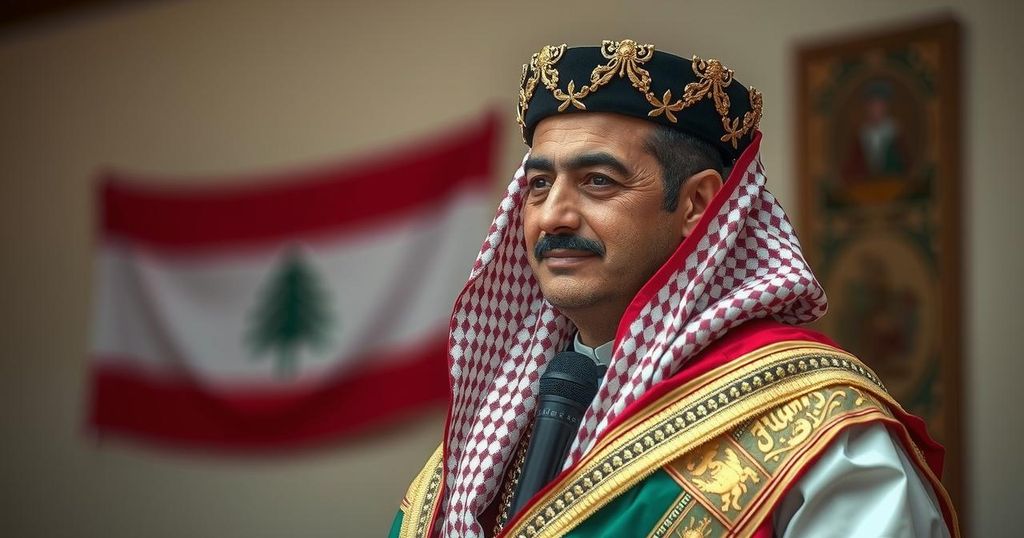Syria and Lebanon Forge New Relations Amid Calls for Cooperation

Syria’s new leader Ahmad Sharaa called for a renewal of ties with Lebanon, emphasizing long-term strategic relations during a press conference with Prime Minister Najib Mikati. This meeting marks a shift from past conflicts towards mutual respect and cooperation, focusing on border security and addressing historical grievances. Sharaa reassured that future interactions would not favor any Lebanese party, aiming to solve bilateral issues through dialogue.
On January 11, Beirut witnessed the emergence of a renewed diplomatic stance as Ahmad Sharaa, Syria’s new leader, urged Lebanon to move past its tumultuous historical ties with Syria. During a joint press conference with Lebanese caretaker Prime Minister Najib Mikati, Sharaa emphasized the importance of establishing a constructive and respectful partnership that prioritizes mutual interests between the two nations. The discussions highlighted the aspiration for long-term strategic relations, which would facilitate resolution of outstanding issues, particularly regarding border management and illegal crossings.
Sharaa stated that the recent meeting marked the beginning of a new chapter in Syrian-Lebanese relations, acknowledging the damages wrought by the previous Assad regimes. While under Hafez Assad’s and Bashar Assad’s rule, Lebanon faced significant Syrian political manipulation, resulting in lasting repercussions on its governance and political stability.
Since the withdrawal of Syrian troops in 2005 and the rise of unrest following the Arab Spring, Syria’s influence in Lebanon has witnessed a significant decline. Sharaa reassured that his government intends to refrain from favoring any particular Lebanese faction in its governance, promoting resolution through dialogue and cooperation. The focus included the urgent need to secure borders to combat rampant smuggling activities, as well as a commitment to resolve the plight of Lebanese individuals who vanished during the Syrian military’s presence.
Additionally, the matter of American journalist Austin Tice, reportedly abducted by Syrian forces, was raised, with assurances that the new administration would prioritize his case. This summit signifies a critical moment in redefining Syrian-Lebanese relations in the wake of profound changes brought about by the fall of Assad and the evolving geopolitical landscape.
The historical context of Syrian-Lebanese relations traces back to decades of Syrian military presence and political manipulation which have greatly affected Lebanon’s governance and social fabric. Following the Lebanese Civil War, Syria assumed control over Lebanon under the pretense of peacekeeping, as evidenced by the Taef Agreement of 1990. This arrangement facilitated Syria’s dominance over Lebanon’s political landscape, contributing to systematic interference in governance processes. The withdrawal of Syrian forces in 2005 marked a turning point, as Lebanon sought to reclaim its sovereignty amidst a backdrop of strained relations post-Assad’s regime and evolving political dynamics in the region, particularly after 2011 when Assad faced significant unrest.
In conclusion, the recent dialogues between Syrian leader Ahmad Sharaa and Lebanese caretaker Prime Minister Najib Mikati indicate a pivotal shift towards fostering a more respectful and cooperative bilateral relationship. Reiterating commitments to resolve historical grievances and emphasizing strategic ties, both leaders have laid out a roadmap focusing on border security, mutual interests, and ongoing humanitarian concerns. With Lebanon’s historical struggles against Syrian influence, this development represents an opportunity for both nations to redefine their relationship through dialogue and collaboration, aiming for stable governance and regional security.
Original Source: www.upi.com








